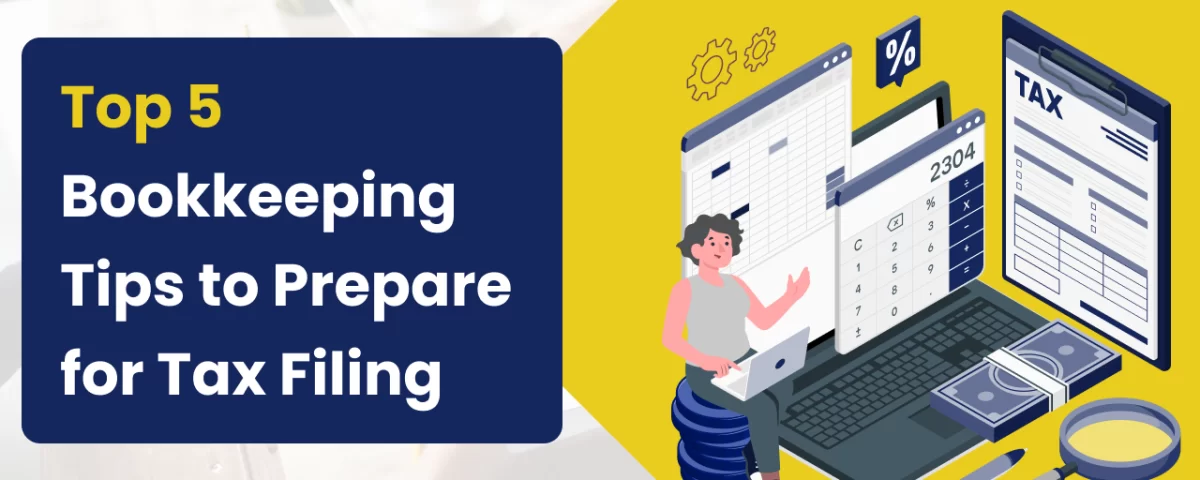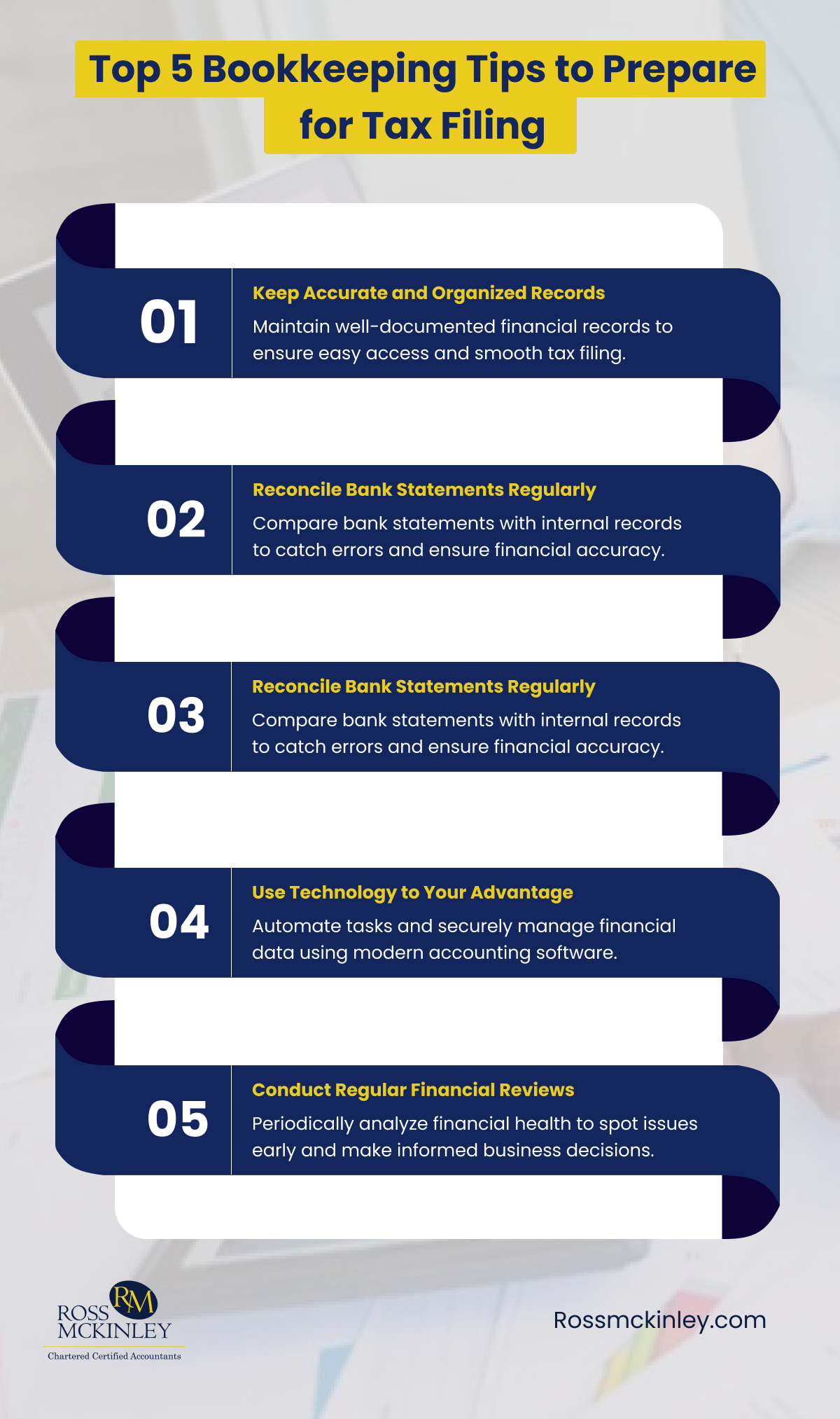
Benefits of Outsourcing Bookkeeping
May 20, 2025
How to Handle Depreciation and Amortization in Bookkeeping
May 22, 2025Top 5 Bookkeeping Tips to Prepare for Tax Filing

Ah, tax season—the time of year that makes even the most organized business owners break into a sweat. Let’s be real, no one gets excited about sifting through piles of invoices, receipts, and bank statements to file taxes. But whether you’re a seasoned entrepreneur or a newcomer to the business world, getting your books in order is crucial if you want to sail smoothly through tax time.
Why? Poorly managed finances don’t just make tax filing harder; they can cost you time, money, and peace of mind. But here’s the good news, with some practical strategies and a bit of discipline, you can transform tax season from a stress fest into just another business task on your calendar.
So, how do you do it? We’ve got you covered with these five essential bookkeeping tips to prepare for tax filing.

Table of Contents
Top 5 Bookkeeping Tips to Prepare for Tax Filing
Good bookkeeping isn’t just about keeping track of numbers, it’s about creating a strong foundation for accurate tax reporting and financial health. By staying proactive and adopting these strategies, you’ll not only make tax time more manageable but also gain better control of your business finances.
1. Keep Accurate and Organized Records
Keeping your financial records neat and well-organized may seem like a no-brainer, but it’s surprising how many businesses neglect this fundamental practice. When it comes to tax filing, having everything documented accurately can be the difference between a smooth filing process and hours of frustration.
Bookkeepers should diligently record invoices, receipts, and bank transactions throughout the year. This includes categorizing expenses correctly, such as differentiating between office supplies and marketing costs. Plus, when it’s time to file, everything you need is easily accessible, and no last-minute scrambling is required.
2. Reconcile Bank Statements Regularly
Reconciling your bank statements may sound tedious, but it’s one of the most effective ways to catch errors and maintain financial accuracy. This process involves comparing your business’s financial records with your bank statements to ensure everything matches up.
Regular reconciliation allows you to spot and correct mistakes, like double entries or missing payments before they turn into bigger problems. By making this a monthly habit, you’ll save yourself from unnecessary headaches coming tax season.
3. Stay Updated on Tax Laws and Filing Deadlines
Tax regulations are constantly evolving, and what was true last year might not apply this year. Staying informed about changes in tax laws can help you avoid penalties and take advantage of new deductions or credits.
Business owners should make it a point to consult with tax professionals or subscribe to industry newsletters that provide updates on tax rules. Knowing when taxes are due and understanding the paperwork involved are equally important. Keeping track of deadlines ensures that you file on time, avoiding costly late fees.
4. Use Technology to Your Advantage
Gone are the days when bookkeeping meant spending hours hunched over spreadsheets or ledgers. Modern technology has revolutionized the way businesses manage their finances, making it easier and more efficient than ever before.
Accounting software like QuickBooks or Xero can automate routine tasks such as tracking expenses, generating invoices, and producing financial reports. Receipt management apps help capture and categorize expenses in real-time, while cloud-based storage keeps your financial data secure and accessible.
5. Conduct Regular Financial Reviews
Just as you go for regular health check-ups to stay fit, your business finances need periodic reviews to remain in good shape. Financial reviews provide insights into your business’s performance and help you spot potential issues early on.
This not only helps with tax preparation but also aids in strategic decision-making and resource allocation. By staying on top of your financial health, you can identify tax-saving opportunities and make better business decisions throughout the year.
The Importance of Proactive Bookkeeping for Tax Efficiency
Proactive bookkeeping is more than just a business best practice—it’s a game-changer when it comes to tax efficiency. Waiting until the last minute to organize your financial records often leads to missed deductions, costly errors, and unnecessary stress. On the other hand, maintaining accurate books throughout the year allows for smoother tax preparation and greater financial clarity.
When you consistently record and categorize transactions, track expenses, and reconcile accounts, your tax filing process becomes much more manageable. You’ll have easy access to crucial financial data, ensuring that you’re claiming every eligible deduction and staying compliant with tax laws. Additionally, proactive bookkeeping allows you to identify potential cash flow issues and correct errors well before they impact your financial standing.
Ultimately, investing time and effort into proactive bookkeeping pays dividends when tax season rolls around. You save time, avoid penalties, and gain peace of mind knowing your finances are in tip-top shape. Isn’t that a smart way to run your business?
Partner with Ross McKinley for Expert Bookkeeping Services
At Ross McKinley, we know that tax season can be stressful. That’s why we’re here to take the burden off your shoulders. Our expert bookkeepers specialize in organizing financial records, reconciling accounts, and preparing tax-ready documentation.
We stay updated on the latest tax regulations so you don’t have to. Whether you need help catching up on past bookkeeping tasks or maintaining year-round financial organization, we’ve got your back. With Ross McKinley, you can focus on running your business while we handle the numbers.
Conclusion
Tax season doesn’t have to be a nightmare. By keeping accurate records, reconciling accounts, staying informed on tax laws, leveraging technology, and conducting regular financial reviews, you’ll be well-prepared when it’s time to file.
And if you’re looking for a trusted partner to help you along the way, Ross McKinley Bookkeeping Services is just a call away. So why stress? Get proactive, stay organized, and take control of your finances today.
